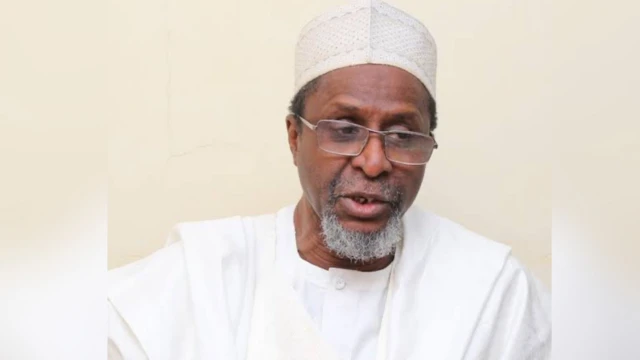Balarabe Abbas Lawal has redefined environmental governance in Nigeria. As the Minister of Environment under President Bola Tinubu’s administration, Lawal’s tenure embodies visionary policymaking, practical implementation, and collaborative efforts that have transcended traditional boundaries of environmental stewardship. His multifaceted contributions span ecological sustainability, national security, and socioeconomic development, making him a beacon of transformative leadership.
Lawal’s most notable achievements lie in his innovative approach to combating climate change and revitalising Nigeria’s environment. His leadership has seen the implementation of groundbreaking initiatives that address both longstanding and emerging environmental challenges.
The Ogoni Cleanup, a long-stalled project, gained unprecedented momentum under Lawal’s stewardship. Lawal earned widespread community support by engaging local stakeholders and launching tangible projects such as potable water schemes and the Centre for Excellence for Environmental Remediation in Wiiyaakara. This initiative is a testament to his commitment to restoring degraded environments and improving the lives of those most affected.
Recognising the urgency of combating deforestation, Lawal led the distribution of 45 million tree seedlings nationwide. This monumental effort mitigates deforestation and promotes reforestation and ecosystem balance.
The Agro-Climatic Resilience in Semi-Arid Landscapes (ACReSAL) project has restored 350,000 hectares of degraded land. This initiative underscores Lawal’s dedication to fostering resilience in communities affected by desertification and climate change.
Lawal championed the National Clean Cooking Policy, a programme to reduce deforestation and the health hazards associated with traditional cooking methods. By advocating eco-friendly cooking solutions, he has improved household air quality and reduced pressure on forest resources.
Lawal’s innovative approach ties environmental conservation to national security, tackling issues threatening Nigeria’s stability and prosperity.
In collaboration with the National Security Adviser, Lawal spearheaded the training and expansion of Forest Guards. This initiative bolsters the capacity to combat illegal activities such as banditry, poaching, and logging in national parks and forests.
Lawal’s advocacy for addressing illegal wildlife trafficking has heightened awareness of the critical connection between biodiversity and national security. His efforts have protected Nigeria’s natural heritage and contributed to regional stability.
Recognising Lake Chad’s ecological and socioeconomic importance, Lawal led international efforts to restore the lake’s ecosystem. Collaborating with global partners from the EU, UAE, and Canada, he has explored innovative strategies such as water diversion and sustainable water management. These efforts aim to stabilise the region and revitalise local economies dependent on the lake.
Lawal has positioned Nigeria as a key player in international climate diplomacy, driving ambitious commitments and fostering global partnerships. Representing Nigeria at COP28, Lawal highlighted transformative initiatives to reduce methane and CO₂ emissions, promote climate-smart agriculture, and expand renewable energy adoption. His compelling advocacy ensured that Nigeria’s voice resonated on the global stage.
Lawal has partnered with the Chinese Ministry of Ecology and Environment, among other entities, to address critical issues such as food security, energy stability, and poverty alleviation. These partnerships reflect his ability to align national goals with global priorities.
Lawal’s commitment to robust environmental governance is evident in his legislative advocacy and judicial reforms.
Working alongside the UN Office on Drugs and Crime (UNODC), Lawal has intensified efforts to combat environmental crimes such as poaching and illegal logging. These actions safeguard Nigeria’s biodiversity and promote sustainable resource management.
To ensure swift justice for environmental violations, Lawal proposed the establishment of an Environmental Tribunal. This initiative aims to deter environmental crimes and reinforce accountability.
Lawal has prioritised grassroots involvement in environmental projects, ensuring the benefits extend directly to local communities. He has bolstered food security and sustainable development through initiatives such as the 50×2030 project, which enhances agricultural data systems. These projects create employment opportunities, improve local infrastructure, and foster inclusive growth.
Lawal has developed strategies to mitigate environmental risks such as erosion and flooding in Nigeria’s coastal regions. Collaborating with state governments and the World Bank, he has promoted sustainable management practices, safeguarding vulnerable communities and ecosystems.
Under Lawal’s leadership, Nigeria has charted an ambitious environmental roadmap that aligns with the nation’s socioeconomic priorities. His strategies address critical challenges such as desertification, promote climate-resilient agriculture, and foster global partnerships.
Lawal’s mantra, “Please plant a tree today,” encapsulates his belief that environmental stewardship is integral to a nation’s prosperity and global standing. By linking sustainability to national security and community welfare, he has set a benchmark for transformative governance.
Lawal’s tenure as Minister of Environment is marked by a holistic approach to policymaking that integrates environmental, economic, and social dimensions. His efforts have enhanced the nation’s global reputation as a leader in sustainable development.
Balarabe Abbas Lawal’s extraordinary leadership exemplifies the power of visionary governance in addressing complex challenges. His achievements, ranging from revitalising degraded ecosystems to strengthening environmental security, showcase a comprehensive approach to sustainability. By fostering international collaboration, empowering local communities, and advocating for robust environmental laws, Lawal has laid the foundation for a more resilient and prosperous Nigeria.











